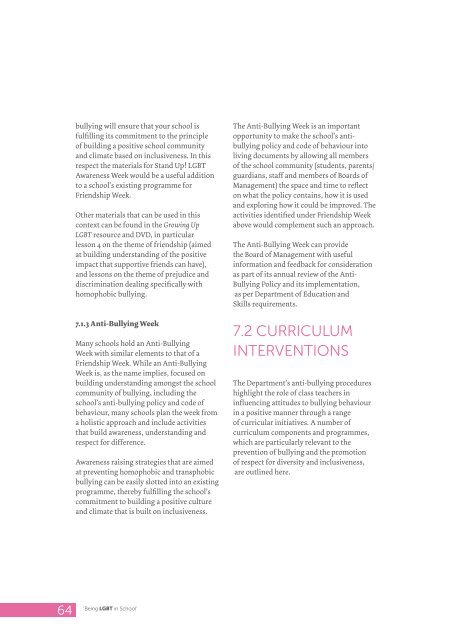‘BEING LGBT IN SCHOOL’
GLEN__Being_LGBT_in_School_10_Feb_2016_Web_3
GLEN__Being_LGBT_in_School_10_Feb_2016_Web_3
You also want an ePaper? Increase the reach of your titles
YUMPU automatically turns print PDFs into web optimized ePapers that Google loves.
ullying will ensure that your school is<br />
fulfilling its commitment to the principle<br />
of building a positive school community<br />
and climate based on inclusiveness. In this<br />
respect the materials for Stand Up! <strong>LGBT</strong><br />
Awareness Week would be a useful addition<br />
to a school’s existing programme for<br />
Friendship Week.<br />
Other materials that can be used in this<br />
context can be found in the Growing Up<br />
<strong>LGBT</strong> resource and DVD, in particular<br />
lesson 4 on the theme of friendship (aimed<br />
at building understanding of the positive<br />
impact that supportive friends can have),<br />
and lessons on the theme of prejudice and<br />
discrimination dealing specifically with<br />
homophobic bullying.<br />
7.1.3 Anti-Bullying Week<br />
Many schools hold an Anti-Bullying<br />
Week with similar elements to that of a<br />
Friendship Week. While an Anti-Bullying<br />
Week is, as the name implies, focused on<br />
building understanding amongst the school<br />
community of bullying, including the<br />
school’s anti-bullying policy and code of<br />
behaviour, many schools plan the week from<br />
a holistic approach and include activities<br />
that build awareness, understanding and<br />
respect for difference.<br />
Awareness raising strategies that are aimed<br />
at preventing homophobic and transphobic<br />
bullying can be easily slotted into an existing<br />
programme, thereby fulfilling the school’s<br />
commitment to building a positive culture<br />
and climate that is built on inclusiveness.<br />
The Anti-Bullying Week is an important<br />
opportunity to make the school’s antibullying<br />
policy and code of behaviour into<br />
living documents by allowing all members<br />
of the school community (students, parents/<br />
guardians, staff and members of Boards of<br />
Management) the space and time to reflect<br />
on what the policy contains, how it is used<br />
and exploring how it could be improved. The<br />
activities identified under Friendship Week<br />
above would complement such an approach.<br />
The Anti-Bullying Week can provide<br />
the Board of Management with useful<br />
information and feedback for consideration<br />
as part of its annual review of the Anti-<br />
Bullying Policy and its implementation,<br />
as per Department of Education and<br />
Skills requirements.<br />
7.2 CURRICULUM<br />
<strong>IN</strong>TERVENTIONS<br />
The Department’s anti-bullying procedures<br />
highlight the role of class teachers in<br />
influencing attitudes to bullying behaviour<br />
in a positive manner through a range<br />
of curricular initiatives. A number of<br />
curriculum components and programmes,<br />
which are particularly relevant to the<br />
prevention of bullying and the promotion<br />
of respect for diversity and inclusiveness,<br />
are outlined here.<br />
64<br />
‘Being <strong>LGBT</strong> in School’


